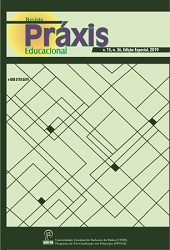INTERNET FOR STUDENT EARNINGS: WORKING PLACE OR COMMUNICATION SPACE
DOI:
https://doi.org/10.22481/praxisedu.v15i36.5871Keywords:
e-business, Student youth, Internet, Social networks, CommunicationAbstract
Teacher work overload can cause challenges for teachers leading to burnout in the long term if not addressed. Consequently, the present study aims at examining the sources of burnout prevention from EFL (English as a foreign Language) supervisors’ perspectives. The participants were 85 Iranian EFL supervisors whose job was observing and giving feedback to teachers about their teaching performance at various levels of language proficiencies from elementary to advanced levels. A sequential mixed method design was employed in this study. First, collection of qualitative data was performed using interviews with 30 participants in order to determine the sources of burnout prevention from supervisors’ perspectives. Next, a burnout prevention questionnaire was designed using the results of the interviews, after which it was administered to the remaining participants. The collected data were factor analyzed to identify the components of burnout prevention construct. Results of content analysis of the interview data indicated that teachers’ support from their colleagues, less stressful situation, and job satisfaction were the main sources of burnout prevention. Factor analysis showed the same sources of burnout as the main components of the burnout prevention construct. The findings of this study emphasize on the contribution of teachers’ educational and emotional support, providing constructive and healthy working place, as well as desirable income as ways for prevention of burnout in EFL teachers.
Downloads
Downloads
Published
How to Cite
Issue
Section
License
Você é livre para:
Compartilhar - copia e redistribui o material em qualquer meio ou formato; Adapte - remixe, transforme e construa a partir do material para qualquer propósito, mesmo comercialmente. Esta licença é aceitável para Obras Culturais Livres. O licenciante não pode revogar essas liberdades, desde que você siga os termos da licença.
Sob os seguintes termos:
Atribuição - você deve dar o crédito apropriado, fornecer um link para a licença e indicar se alguma alteração foi feita. Você pode fazer isso de qualquer maneira razoável, mas não de uma forma que sugira que você ou seu uso seja aprovado pelo licenciante.
Não há restrições adicionais - Você não pode aplicar termos legais ou medidas tecnológicas que restrinjam legalmente outros para fazer qualquer uso permitido pela licença.












